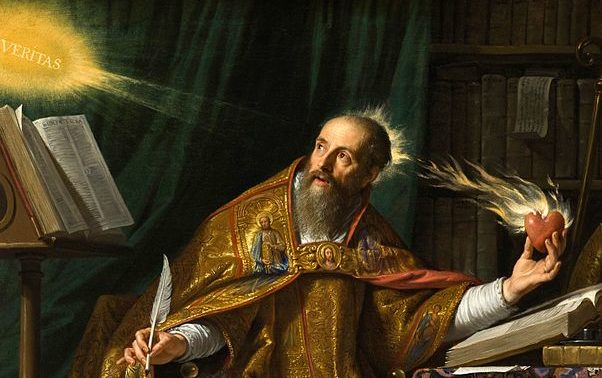“You have made us for yourself, Lord, and our hearts are restless until they rest in you.”
No single line, outside of Scripture, has ever spoken to me as powerfully, as persistently, and as hauntingly, as that line from St. Augustine. In essence, it’s Augustine’s life story — and the story of each of our own lives as well.
As I read and study, I am often struck by a powerful line in some author which I immediately underline and copy. I have a whole booklet of quotes from Shakespeare, Aristotle, Plato, Aquinas, Teilhard, Einstein, Albert Camus, Steve Hawkings, Doris Lessing, Milan Kundera, John Steinbeck, Karl Rahner, John of the Cross, Ruth Burrows, James Hillman, Anne Frank, and Ivan Illich, among others. Yet, Augustine’s haunting line stands out among all these.
What he asserts is that there is an incurable restlessness inside each of us that keeps us perpetually dis-eased. I have always felt this strongly in my own life and, while still in my 20s, wrote a book, “The Restless Heart,” in which I tried to articulate a spirituality for the restless (and perhaps mostly for myself) on the basis of this line from Augustine. Through the years, I have kept my eyes open for comparable and complementary expressions of Augustine’s famous axiom. Here are some:
Karl Rahner, a renowned theologian of the late 20th century, in writing to a friend who feared he was missing out on too much in life, offered this counsel: “In the torment of the insufficiency of everything attainable, we learn that in this life there is no finished symphony.”
The biblical author, Qoheleth, expresses it this way. In a passage familiar to most of us (“there is a season for everything”) he lays out for us the rhythm of nature as God set it up. He tells us there’s a beautiful rhythm to time and nature and that everything has its proper time and place. However, he then ends with this stunning statement: “God has made everything beautiful in its own time, but God has put timelessness into the human heart so that we are out of sync with time and the seasons from the beginning to the end.” We never peacefully fit into the rhythm of things because something inside us is outside of time.
And who can forget the haunting words of Anne Frank, writing as a teenager locked away in an attic, hiding from the Nazis, jumping out of her skin with the restlessness of an adolescent and the anxiety of an artist, sharing that she simply can never be fully in the moment because “I want to be everywhere all at the same time.”
Doris Lessing, the British novelist, asserts that inside each of us there’s a powerful, relentless energy (“1,000 volts”) which keeps us perpetually dis-eased. Writing outside of a faith perspective, she asks, what is this energy for? Her answer: For everything and for anything — creativity, love, sex, justice. Nobel Prize-winning writer, Albert Camus, also writing outside of any faith perspective, had this interesting way of understanding the human spirit. He compared being inside human nature to being a prisoner trapped inside a medieval prison. Medieval prisons were designed to break the prisoner’s spirit by putting him in a room too small for him to ever fully stand up or to ever fully stretch out. The ceiling was too low and the room was too narrow. The intent was that eventually this would break a prisoner’s spirit. For Camus, that’s how we experience ourselves inside our own nature. The world is simply too small for us to ever really stand up or to ever really stretch out, and this wears away on our spirit.
These are some poignant expressions of this dis-ease, but there are expressions of it everywhere. Hinduism speaks of a certain “nostalgia for the infinite” inside us; Plato speaks of a “divine madness” at the center of the soul; Shakespeare speaks of our “immortal longings; Ruth Burrows opens her autobiography by confessing that she was “born with a pathological complexity which has made her life a struggle.” James Hillman, in a brilliant book, “Suicide and the Soul,” submits that most suicides occur because the soul is not being heard and consequently kills the body. And Philip Roth speaks of “the blizzard of details that constitute the confusion of human biography.”
Literature, philosophy, poetry, art, psychology, biography, theology, and spirituality are replete with expressions of this insatiability inside the human soul, which ultimately cannot come to full peace with anything in this world.
But this is as it should be. For Augustine, writing some 1,700 years ago, this restlessness, this timelessness, this homesickness, this divine madness, these 1,000 volts of energy inside us, this pathological complexity, and this confusion of human biography that keeps us perpetually restless, is at the end of the day our greatest attribute; it’s God’s gift to us of immortality and divinity as a constitutive part of our soul.

